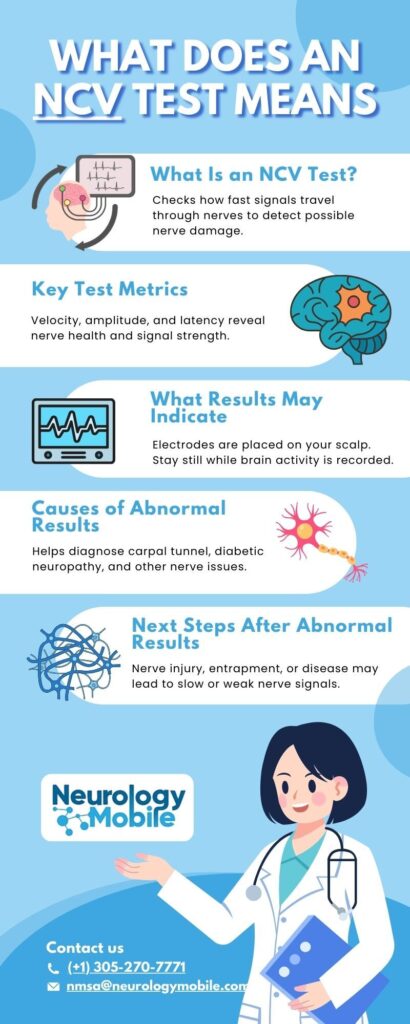4 min read
Decoding NCV Test Results: What Do They Mean for Your Health?
Are you curious about the results of your recent NCV test? Wondering what those numbers and abbreviations actually mean for your health? You’re in the right place! In this article, we’ll decode the mystery behind NCV test results and help you understand their significance. Nerve Conduction Velocity (NCV) tests are diagnostic procedures that measure the speed at which electrical impulses travel through your nerves. By evaluating the health and functionality of your nerves, NCV tests can provide valuable insights into various neurological conditions and peripheral nerve disorders. From understanding the different parameters and measurements to deciphering the implications of abnormal results, we’ll guide you through the process step by step.
So, whether you’re awaiting your NCV test results or simply looking to expand your knowledge, join us as we unravel the secrets behind NCV test results and gain a clearer understanding of what they mean for your overall health.

1.Understanding NCV tests: What are they and why are they conducted?
2.Interpreting NCV test results: What do the different measurements mean?
4.Potential causes for abnormal NCV test results
5.What to do if your NCV test results are abnormal
1. Understanding NCV tests: What are they and why are they conducted?
NCV tests play a crucial role in diagnosing and monitoring various nerve-related conditions. Here are some examples of how NCV test results are interpreted for common conditions:
1. Carpal Tunnel Syndrome: NCV test results can help confirm the diagnosis of carpal tunnel syndrome, a condition characterized by the compression of the median nerve in the wrist. In this case, the NCV test may reveal a slower nerve conduction velocity and reduced amplitude across the affected nerve.
2. Diabetic Neuropathy: NCV tests are often used to assess nerve damage in individuals with diabetes. In diabetic neuropathy, the NCV test may show decreased conduction velocities and reduced amplitudes, indicating nerve damage caused by high blood sugar levels.
Understanding how NCV test results correlate with specific conditions can provide important insights into the management and treatment options available.
Do You Also Need an EMG Test?
If you’re getting an NCV test, your doctor might also recommend an EMG (Electromyography) to get a more complete picture of your nerve and muscle health.
💡 NCV + EMG = Better diagnosis, better treatment plan.
👉 Learn what an EMG test involves, when it’s needed, and how to prepare for it here:
Take control of your health — start by understanding your tests.
What Do NCV Test Results Mean?
Let’s break down the key values:
- Velocity: How fast the signal travels. A slow NCV may point to nerve damage or demyelination.
- Amplitude: Strength of the nerve signal. Low amplitude often means nerve fiber loss.
- Latency: Delay in response time. High latency might indicate compression or blockages.
What Is a Normal NCV Value?
A typical nerve conduction speed is 50–60 meters/second. Values outside this range could suggest problems, depending on which nerve is tested and patient factors like age or temperature.
What Does a High or Low NCV Indicate?
- High NCV: Rare, but can happen in young or athletic individuals, or due to testing conditions (e.g. high skin temperature).
- Low NCV: May suggest:
- Peripheral neuropathy
- Carpal tunnel syndrome
- Demyelinating diseases
- Nerve compression
Don’t stay in the dark about your health. If you’re looking for answers or next steps, Neurology Mobile offers expert insights and personalized care.
👉 Schedule your nerve conduction testing near me and get the clarity you deserve today.
What Does “NCV Stand For”?
NCV = Nerve Conduction Velocity
It’s the speed at which electrical signals travel through a nerve.
What Does NCV Detect?
An NCV test can help detect:
- Nerve compression (e.g., carpal tunnel)
- Nerve damage due to diabetes
- Injuries affecting the peripheral nervous system
- Early signs of neurological conditions
What if My NCV Is Slower Than Normal?
A significantly slower NCV may suggest:
- Myelin sheath damage (protective layer around nerves)
- Chronic nerve compression
- Systemic issues like diabetes or autoimmune disorders
👉 If this shows up in your results, you should follow up with a neurologist or specialist ASAP.
📋Quick NCV Summary
| Term | What It Means |
|---|---|
| NCV | Nerve Conduction Velocity |
| High NCV | Often normal; rarely indicates a problem |
| Low NCV | May signal nerve damage or disease |
| Slow NCV | Possible myelin or nerve fiber damage |
| Test detects | Nerve speed, response, and integrity |
What Should I Do With My NCV Results?
- Talk to your doctor – Never self-diagnose.
- Ask for EMG – Often combined with NCV to get the full picture.
- Follow up – Treatment depends on what’s found: therapy, medication, lifestyle changes, etc.
2. Interpreting NCV test results: What do the different measurements mean?
When you receive your NCV test results, you may come across various measurements and abbreviations. Understanding what these numbers mean is crucial in deciphering the health of your nerves. Let’s take a closer look at the different parameters and measurements that are commonly reported in NCV test results.
1. Nerve Conduction Velocity (NCV): This measurement indicates how fast the electrical impulses travel through your nerves. Normal NCV values vary depending on the specific nerve being tested, but they generally fall within a certain range. Slower conduction velocities may suggest nerve damage or impairment, while faster velocities may indicate hyperactive nerves.
2. Amplitude: The amplitude refers to the size of the electrical response produced by the nerve. It represents the strength of the nerve signal and can help identify any abnormalities. Reduced amplitudes may indicate nerve damage or dysfunction.
3. Latency: Latency refers to the time it takes for the electrical impulse to travel from the stimulation site to the recording site. Prolonged latencies may suggest nerve damage or compression.
By analyzing these measurements, healthcare professionals can better understand the health of your nerves and pinpoint any underlying issues that may be affecting your overall well-being.
3. NCV test results for common nerve-related conditions (e.g., carpal tunnel syndrome, diabetic neuropathy)
NCV tests play a crucial role in diagnosing and monitoring various nerve-related conditions. Here are some examples of how NCV test results are interpreted for common conditions:
1. Carpal Tunnel Syndrome: NCV test results can help confirm the diagnosis of carpal tunnel syndrome, a condition characterized by the compression of the median nerve in the wrist. In this case, the NCV test may reveal a slower nerve conduction velocity and reduced amplitude across the affected nerve.
2. Diabetic Neuropathy: NCV tests are often used to assess nerve damage in individuals with diabetes. In diabetic neuropathy, the NCV test may show decreased conduction velocities and reduced amplitudes, indicating nerve damage caused by high blood sugar levels.
Understanding how NCV test results correlate with specific conditions can provide important insights into the management and treatment options available.

4. Potential causes for abnormal NCV test results
Abnormal NCV test results can indicate various underlying causes. Some potential reasons for abnormal results include:
1. Nerve damage: Trauma, compression, inflammation, or diseases such as diabetes or autoimmune disorders can lead to nerve damage, resulting in abnormal NCV test results.
2. Nerve entrapment: Conditions like carpal tunnel syndrome or ulnar neuropathy can cause nerve entrapment, leading to abnormal NCV test results.
3. Nerve degeneration: Certain neurological conditions, such as peripheral neuropathy or amyotrophic lateral sclerosis (ALS), can cause nerve degeneration, resulting in abnormal NCV test results.
Identifying the cause of abnormal NCV test results is crucial for determining the appropriate treatment and management strategies.
Understanding your NCV test results is just one part of protecting your neurological health. If you’re experiencing unexplained sensations, weakness, or other unusual signs, don’t overlook them. Check out our article on Neurological Symptoms You Shouldn’t Ignore to learn when it’s time to seek medical help.
5. What to do if your NCV test results are abnormal
If your NCV test results are abnormal, it is important not to panic. Abnormal results do not always indicate a serious condition, but they do warrant further investigation and evaluation. Your healthcare provider will likely recommend additional tests or refer you to a specialist for further analysis. Depending on the underlying cause, treatment options may include medications, physical therapy, lifestyle modifications, or surgical interventions.
Remember, early detection and intervention can significantly improve the outcome and prevent further damage to your nerves. It is essential to follow up with your healthcare provider and discuss the next steps for managing your condition.

